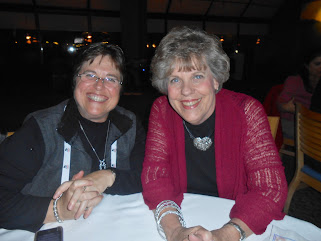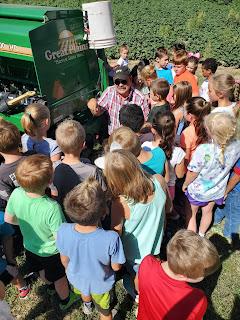By Vicki Bechard,
former LFKS Secretary
I sat down to write this blog at the end of September with a heavy heart, as a way to process a tremendous personal and professional loss, and as a tribute really, to my friend, colleague and partner in professional learning Dayna Richardson. True to Dayna’s love/hate relationship with technology, we have had some technical issues getting the blog to post, so it is appearing later than we’d intended but this gives us a chance to continue to keep Dayna’s memory fresh in our minds and heart. I can visualize her laughing at our technology struggles as she proclaims "user error!" And indeed it was!
Dayna Richardson was the heart and soul of professional learning in South Central Kansas, perhaps even the whole state, and her influence extended nationally too. Whether she was part of a school system, creating an organization like ESSSDACK, leading the state’s professional learning organization, or advising state education officials, she was always working to support teachers and administrators by helping them discover how to learn best, how to create culture of learning, and how to ensure those strategies would live on in school improvement and accreditation efforts. She never shied away from a challenge. Learning Forward Kansas would not be where it is today without her leadership, her vision, and her never ending possibility thinking. She was a lifelong learner and found so many ways to share her understanding with others – usually in multiple colors, fonts, and organizational structures, with quotes, pictures, and short videos thrown in to make connections and deepen understanding.
In the time Dayna and I worked together on a variety of projects to promote professional learning, our research and collaborative conversations expanded our understanding of what worked best. We were partners in learning. She was a big promoter of the work of Simon Sinek….and how finding and focusing on the “why” helped shape one’s success. She had a quote for every situation but one that we relied on a great deal came from Maya Angelou – “Do the best you can until you know better. Then when you know better, do better.”
Dayna was always about growth and improvement. She studied change theory and how we could use this understanding to effectively make a significant difference in how schools and educators do business. We laughed about “change is hard, you go first” but in reality change is hard and the more we know how change affects everyone, the better we can determine the most effective ways to move forward. I hear her asking,“Why do we want to get better? How can we get better? How will we know?” And she believed and modeled the idea that we are “better together.” Collaboration was included in all that she/we did. Collective efficacy became a goal of an effective culture of learning as she promoted excellence for every school. I probably am most proud of the video series we created with the help from our technical expert Rosemary Miller, entitled “Inspired to Learn: Kansas Stories.” This was a vision without a real skill set that turned into a resource we will always have that shares the why, how and what of professional learning, collaboration, collective efficacy, and leadership for and by Kansas educators. Dayna narrated those videos so we will forever be able to hear her words of wisdom at the click of a link.
As I reflect on my work with Dayna, I have thought about
the many “Daynaisms” that can be attributed to her. She was a coach and mentor and always looked
for ways to tactfully get people to examine their own thinking or actions. She asked great questions. She phrased common statements or questions in
ways that may not seem important but always protected the dignity of the person
she was speaking with while encouraging them to accept the responsibility of
the action. Some of those might include:
·
Find ways to touch people’s hearts.
·
Change “You NEED” to do that; to “You WANT” to
do that.
·
Replace “SHOULD” with “CONSIDER”
·
Gentle
reminder…. Sometimes it didn’t feel gentle when you knew you’d forgotten to
do whatever it was, but she was always kind, no matter what.
·
She often used metaphors or examples to
illustrate a point. For example, Culture eats strategy for breakfast (a
quote from Peter Drucker) was one of her favorites. This was clearly to help people understand
that even the best strategies will only work within the right culture so the
time and effort spent building that culture is worth it to achieve the best
results.
· She hated routine (even though it was important) paperwork, but she loved paper. We always had colorful handouts loaded with information, sticky notes, and big sticky posters to use in workshops to organize and share information. She often printed out draft copies so she could get a better look when proofreading. She literally saved everything! Sometimes we sent each other pictures of our messy office spaces! J
If I only write this from the perspective of how she affected change in education and professional learning, then we miss the personal part of Dayna that endeared her to many. We started out as colleagues in LFKS. We became fast friends. Many have known Dayna longer, but it doesn’t matter if you knew her for one year or 50 years, she left her mark on you. Her smile won you over in a second. Laughter came easily and often. She truly cared about the people with whom she interacted. She made me feel valued and appreciated as I know she did the same for others too. We talked often, and as we worked more closely, we eventually completed each other’s sentences too when editing. We were so different in the way we approached a task, but we were attuned in purpose, humor, and common interests. She was a Mac, colorful and creative; I’m a PC, more linear and functional. But we complemented each other in important ways and produced quality results.
She was a devoted Jayhawk fan. I am a devoted, purple bleeding K-State fan. I can admit she watched more K-State games than I watched KU games, because in all honesty, she was just a fan’s fan. She accompanied Al to so many Hutchinson Community College basketball games, even taking him to North Texas to watch post season play. Ice cream and chocolate were her favorites. She often stopped at Dairy Queen on her way home from a professional learning meeting or event. She loved sunflowers, sunsets, wheat fields, the hills around Medicine Lodge, and the many beautiful flowers she grew in her yard. Watering them gave her a sense of fulfillment just as she nurtured so many of us in education.
Field trips to Kansas City to watch Dinner Theater or plays often included a Royals game too. She could drive all over Kansas City and not get lost, but those darn Google Docs Folders were much harder to navigate. Sometimes I think she just called me to help her find something on Google Docs so we could talk. J
She loved to shop and sometimes a package from Amazon or a local shop she often patronized would be delivered to my door because she found something purple that I might need. J She loved her family and talked of them often. She was proud to be a Nittler and a Daddy’s girl; but the Disney clan gave her so much pleasure too. Family gatherings, all things Disney (Mickey Mouse especially), gave her so much JOY! She was blessed with the perfect middle name because Joy is what she loved to find in all that she did and what she gave to so many.
We both loved to travel, but her field trips took her around the world and mine were, until recently, confined to many of the beautiful sights within the United States. The idea of seeing something you’d never seen before and taking in the beauty, history and culture that every location provided was the draw for both of us. She was so excited for the trip my husband and I took this summer to Switzerland and up the Rhine River. That was typical Dayna. \She was so happy because we were happy and wanted to hear all about it.
How do we honor the person who has inspired everyone she
met with vision, passion, and endless energy to find ways to get better? How do we reflect on a life well-lived and
ensure her legacy will live on in the students she touched, the educators she
shaped, and the leadership she provided? I believe we do this by living the lessons we learned from her. Enjoy life. Find your passion. Consider
possibilities. Find ways to get better. I think Dayna will be whispering in my ear
with guiding questions, and endless quotes until the day I see her again. \But until then, there will be stops at DQ,
butterflies, sunflowers, and many other things that will be daily reminders of
my dear friend. As she always said, the
joy is in the journey. Thank you for
sharing your joy with all of us. Rest
easy my friend. Job well done.
Pro Tip: Check out the Learning Forward Kansas website for more resources on professional learning. Dayna had a hand in the creation of many of these valuable tools.








